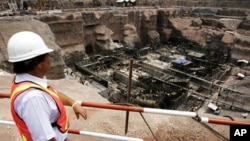As Southeast Asia copes with some of the worst flooding in decades, a series of planned hydroelectric dams in the Mekong Basin are coming under increased scrutiny by environmental experts.
An upcoming vote on the Laos government's proposed Xayaburi dam, just one of 11 planned for the lower Mekong River, may indicate how the projects would have a broader political impact on the region.
Vietnamese and Cambodian officials have joined environmentalists in criticizing Xayaburi, saying it could severely harm fish stocks that are a vital source of protein to some 40 million people. They warn the dam will directly affect over 200,000 people that depend on the river’s ecology as well as millions living downstream.
Carl Middleton of Bangkok’s Chulalongkorn University says strategic environmental assessment reports warn that Xayaburi would entail major changes to river eco-systems and put some 41 species of fish at risk of extinction.
"The project would largely block fish migrations routes for some of the most incredible species in the world, including the Mekong giant catfish," he said.
The $3.5 billion project, which would be the first constructed on the Mekong’s mainstream outside China, would generate 1,260 megawatts of electricity, some 95 percent of which is expected to be bought by Thailand.
Despite the concerns, Lao officials are still pressing for construction, whose final approval rests with the Vientiane-based Mekong River Commission, the group tasked with reviewing the project’s environmental and ecological impact.
The Commission, comprising representatives from Cambodia, Laos, Thailand and Vietnam, is expected to deliver its verdict at a November meeting.
"The meeting is not a technical meeting, because it’s not a technical decision, it’s a political decision that will reshape politics in this very tiny but very problematic region of the world," said Srisuwan Kuankachorn, co-director of Bangkok-based Towards Ecological Recovery and Regional Alliance. "We have to take into account the impact of every dam because if one dam is allowed to be built it will lead to the developments of all the other dams."
Citing concerns over the impact on delta rice growth, Vietnamese government officials have called for a moratorium on construction until the full impacts from all the dams are understood.
“I personally think that the threats from the dams are one of the biggest threats to the Mekong Delta in its entire history," says Nguyen Huu Tien, an agronomist and wetlands specialist from Can Tho. "The key losses include loss of sediment load and the loss of fisheries.”
The delta region produces half the food output of Vietnam as well as 90 percent of its rice exports. The fishing industry in the delta is also a major contributor to regional and national economy stability.
Ecology of Mekong Basin May Hinge on Hydroelectric Vote
- By Ron Corben
